Scripps College
 | |
| Motto | Incipit Vita Nova (Latin) |
|---|---|
Motto in English | "Here begins new life" |
| Type |
Private liberal arts college Women's college |
| Established | 1926 |
| Endowment | $343.2 million[1] |
| Budget | $83 million[2] |
| President | Lara Tiedens |
Academic staff | 122 (88 full-time)(2015)[3] |
| Students | 989 (2015) |
| Undergraduates | 973 (2015)[3] |
| Postgraduates | 16 (2015)[3] |
| Location | Claremont, CA, USA |
| Campus | Suburban, 32 acres (12.9 ha)[4] |
| Colors |
Green and White [5] |
| Athletics | NCAA Division III – SCIAC |
| Nickname | Stags (men) / Athenas (women) |
| Affiliations |
Claremont Colleges NAICU[6] CLAC Annapolis Group |
| Mascot | CMS Athena's La Semeuse ("she who sows") |
| Website | scrippscollege.edu |
 | |
Scripps College is a private liberal arts women's college founded in 1926 in Claremont, California, United States, with an enrollment of 989 students as of 2017.[7] It is a member of the Claremont Colleges, a liberal arts consortium, and is described by the Fiske Guide to Colleges as "easily the premier women's college on the West Coast".[8] It is known for its historic campus and extensive core curriculum. For the 2017 cycle, Scripps accepted 33.4% of applicants, ranking it among the most selective women's colleges in the United States.
History
Scripps College was founded in 1926 by Ellen Browning Scripps, a philanthropist and prominent figure in the worlds of education, publishing and women's rights. According to Scripps, "the paramount obligation of a college is to develop in its students the ability to think clearly and independently, and the ability to live confidently, courageously, and hopefully".[9] Soon after its founding, in 1927 the first dormitory was dedicated in memory of trustee Eleanor Joy Toll.[10]
At the age of 89, Scripps founded the college as one of the institutions in the West dedicated to educating women for both professional careers and personal growth. Scripps' "experiment in education" called for a setting with an artistic connection between buildings and garden landscape on an intimate scale.
In 2001, the college opened a centralized dining facility, Mallott Commons, ending the practice of serving meals in the residence halls.
In 2014, the college began admitting transgender women.[11][12]
The motto of the college is "Incipit Vita Nova" ("Here Begins New Life") from Dante's New Life.[13]
Campus
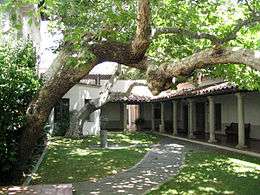
Scripps College is frequently described as one of America's most beautiful college campuses and is listed in the National Register of Historic Places.[14][15] In its 2017 edition of The Best 379 Colleges, the Princeton Review cited the campus as the twelfth most beautiful in the United States, and has been corroborated by Forbes,[16] U.S. News & World Report, The Huffington Post, and others.[17][18]
Scripps College was the first recipient of the Getty Campus Heritage Initiative Program, which documented different aspects of the college that were deemed historically significant and at risk of change.[19] The original historic precinct was recorded and the history of each site (such as residence hall or garden) was given, an original appearance was described, and a recording of changes over time was taken.[20] Different courtyards on site, such as the Sicilian Court, Iris Court, and Margaret Fowler Garden were surveyed and adjusted to resemble their initial designs wherever possible.
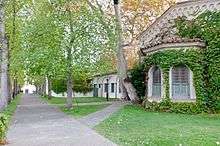
Scripps is located in the center of the Claremont Colleges, surrounded by Harvey Mudd College to the north, Pitzer College to the east, Claremont McKenna College and Pomona College to the south, and Claremont Graduate University to the west. The original campus was designed by Gordon Kaufmann in the Spanish Colonial Revival Style architecture. In general, his 1926 campus plan has been carefully preserved, with major vistas linking the central areas. The overall planting schemes and landscaping devised by Edward Huntsman-Trout [21] are still followed.
The campus also offers a number of interactive landscaping elements, including a rose garden to the north designated for community cutting and fruit trees available for picking. Oranges, grapefruits, pomegranates, kumquats, and loquats are available to students. Scripps also harvests olives from its olive trees and presses it into award-winning olive oil.[22]
Several facilities are shared by the members of the Claremont Consortium including Honnold/Mudd Library, the Keck Science Center, and the Robert J. Bernard Field Station.
Ruth Chandler Williamson Gallery
Scripps College is also the home of the Ruth Chandler Williamson Gallery,[23] which maintains Scripps College's permanent art collection of some 7,500 objects spanning 3,000 years of art history.[24] Objects are available for use in classes, displayed in campus exhibitions, and loaned to other exhibiting institutions. Among the holdings in the collection are works by American artists Andy Warhol, Winslow Homer, Childe Hassam, and John James Audubon, and an extensive collection of paintings by the California artist and Scripps Professor Emeritus Millard Sheets.
Margaret Fowler Garden
.jpg)
Originally designed as a European medieval-style cloister garden to be located east of a proposed (but never built) chapel, the Margaret Fowler Garden is a walled garden located on the Scripps College Campus. The garden is laid out in two distinct sections: the western area contains a sculpture by Albert Stewart called "Eternal Primitive". The western area of the garden also contains a central pool and four walkways extending in the cardinal directions. The eastern end has a Mediterranean style tiled wall fountain and open flagstone area. Arcades run along the north and south sides of the garden.
On the south wall of the Margaret Fowler Garden are murals by Alfredo Ramos Martínez. The College commissioned Martinez in 1945 to paint a mural (entitled "The Flower Vendors" by Martínez) on the south wall of the Fowler garden. Martínez sketched in the entire composition on the plaster wall and began working on several panels before dying unexpectedly on November 8, 1946 at the age of 72, leaving the mural unfinished. In 1994, a grant from the Getty Endowment allowed the mural to be conserved.[25]
Environmental sustainability
Scripps College has several sustainability initiatives underway, from energy conservation to green building practices. On the conservation front, the college has seen monetary and energy savings through use of a new energy management system, and has designed water systems to cut down on waste. Turning "Alumnae Field" into a natural surface also helped in efforts to conserve water. Scripps has also downsized trash bins and made "to-go" containers recyclable, in order to divert more waste from landfills. On the emissions reductions front, maintenance staff use electric blowers and carts (as opposed to gas powered equipment), while a ride-sharing program is available for students, faculty and staff.[26]
For its practices regarding sustainability, Scripps earned a B- on the College Sustainability Report Card 2011, published by the Sustainable Endowments Institute. This grade reflects a quantitative analysis of the effectiveness of the institution's policies. The college received positive recognition for student involvement, on-campus transportation, its food and recycling programs, water programs, and LEED buildings, but fared poorly on the shareholder involvement evaluation category of the report.[27]
Academics
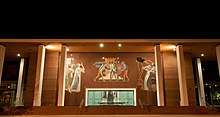
Scripps is a member of the Claremont Colleges, and much of student life revolves around the five colleges, or "5Cs." Scripps College, Claremont McKenna College, Pomona College, Pitzer College, and Harvey Mudd College not only interact socially, but also share dining halls, libraries, and other facilities spread throughout the bordering campuses. All five colleges, along with Claremont Graduate University and Keck Graduate Institute of Applied Life Sciences, are part of the Claremont University Consortium.
Scripps students can cross-register for classes at or enroll in the majors of any of the undergraduate schools at The Claremont Colleges. Top majors for 2013-14 include art, biology, economics, English, French studies, math, politics, and psychology. Classes average 16 students, with an overall student-to-teacher ratio of 10:1. More than 21% choose to double or dual major by the time they graduate. All courses are taught by faculty.
Academics are focused on interdisciplinary humanities, combined with rigorous training in the disciplines.[28] General requirements include classes in mathematics, fine arts, letters, natural sciences, social sciences, foreign language, women's/gender studies, and race/ethnic studies. Scripps also requires first-year students to take a writing course in their first semester.[29] Each graduating student must complete a senior thesis or project.[30]
Rankings
The 2018 annual ranking by U.S. News & World Report categorizes Scripps as 'more selective' and rates it tied for 26th best liberal arts college in the nation,[31] and as the third best women's college, after Wellesley College and Smith College. Forbes in 2016 rated it 83rd in its "America's Top Colleges" ranking of 660 schools, which includes military academies, national universities, and liberal arts colleges.[32] Kiplinger's Personal Finance places Scripps at 34th in its 2016 ranking of best value liberal arts colleges in the United States.[33]
Admissions
| 2017[34] | 2016[35] | 2015[3] | 2014[36] | 2013[37] | |
|---|---|---|---|---|---|
| Applicants | 2,841 | 3,032 | 2,613 | 2,782 | 2,378 |
| Admits | 948 | 903 | 729 | 758 | 849 |
| Admit rate | 33.4% | 29.8% | 27.9% | 27.2% | 35.7% |
| Enrolled | 327 | 270 | 277 | 250 | 272 |
| SAT range | 1938-2185 | 1950-2173 | 1933-2178 | 1900-2190 | 1940-2200 |
| ACT range | 29-33 | 28-32 | 29-32 | 28-33 | 29-32 |
For the class of 2021, Scripps accepted 948 of the 2,841 applicants (33.4%). The middle 50% range of SAT scores for enrolled freshmen was 660-730 for critical reading, 630-730 for math, and 648-725 for writing, while the ACT Composite middle 50% range was 29-33. The average high school GPA of incoming freshmen was 4.07.[34]
The Core Curriculum
A key part of the Scripps experience is the Core Curriculum in Interdisciplinary Studies, a sequence of three classes that encourage students to think critically and challenge ideas. Every first-year student takes Core I in the fall, which introduces students to major ideas that shape the modern world. Core II seminars focus on specific ideas introduced in Core I and are usually team-taught by two professors in different fields, such as physics and art. The concluding Core III classes encourage discussion and critical thinking for first-semester sophomores, culminating in individual projects that often lead to students' senior thesis or project.
Study Abroad
Scripps College also maintains a robust study abroad program, Study Abroad and Global Education. The program, which more than 60% of students take advantage of, offers access to more than 120 approved programs in 86 cities in 47 countries (including domestic exchanges with Spelman College and George Washington University and internships in Silicon Valley and Washington, D.C.).
Student life
Residential life
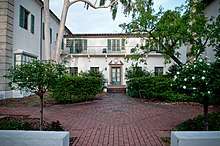
Scripps is a residential campus, with nine halls and on-campus apartments providing living arrangements for all four years of undergraduate study. In 2017, The Princeton Review included Scripps in several of their rankings, such as "Best College Dorms" (#5), "Most Beautiful Campus" (#12), and "Best Campus Food" (#13).[38]
All residence halls are mixed-class halls; first-year students, sophomores, juniors, and seniors live in one shared community. The number of residents in each hall ranges from 70 to 120, and each is governed by a Hall Council made up of five officers elected by the residents of that hall.
As of October 2014, an anonymous donor gifted Scripps College with $10 million to support the construction of a 10th residence hall currently named NEW Hall.[39]
Student Organizations
There are a number of registered clubs and organizations (abbreviated CLORGs) at Scripps.[40] Scripps students also frequently participate in 5C clubs alongside students from the other Claremont Colleges.
A student-run feminist coffeehouse known as The Motley is a popular hangout spot and focal point for social life at the college.[41]
There are several media organizations at Scripps, including The Student Life, which covers all 5Cs, and The Scripps Voice.
Athletics
Scripps varsity athletes compete alongside athletes from Claremont McKenna College and Harvey Mudd College (other consortium members) as the Claremont-Mudd-Scripps Stags and Athenas.[42] The teams participate in NCAA Division III in the Southern California Intercollegiate Athletic Conference.
Athletics history
According to the Division III Fall Learfield Director's Cup Standings for the 2016-2017 year, CMS ranks 12th among all Division III programs, and first among SCIAC colleges.[43] The CMS golf team ranked first among NCAA Division III teams according to Golf Digest, and 17th overall (including Division 1 schools). The rankings are based on the "Balanced" category which is "for students who place equal emphasis on school and sports".[44]
Sports
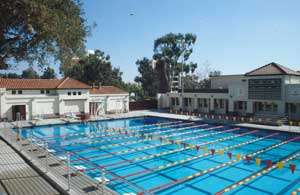
Female Scripps athletes compete on the 11 CMS women's teams:[42]
|
|
There are also 10 CMS men's teams, but these have few if any Scripps athletes.
Athletic facilities
- Basketball and Volleyball — Roberts Pavilion
- Lacrosse — John Zinda Field
- Softball — Softball Field
- Soccer — John Pritzlaff Field
- Swimming and Diving — Matt M. Axelrood Pool
- Tennis — Biszantz Family Tennis Center
- Track and Field — Burns Track Complex[45]
Rivals
The other sports combination of the Claremont Colleges, and CMS' primary rival, is the team made up of Pomona College and Pitzer College known as the Pomona-Pitzer Sagehens (P-P).
Notable alumni
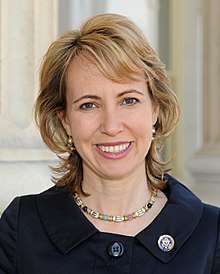
- Helene Mayer (1910–1953), German and American Olympic champion fencer
- Merodie A. Hancock, American academic and president of Thomas Edison State University[46]
- Gabrielle Giffords (Class of 1993), Member of the U.S. House of Representatives, Arizona's 8th district
See also
References
- ↑ As of June 30, 2017. "Scripps College Financial Report 2016-2017" (PDF). Scripps College.
- ↑ "Scripps College 2016 990 Form" (PDF). Guidestar. Retrieved 25 September 2018.
- 1 2 3 4 "Scripps College Common Data Set 2015-2016" (PDF). Scripps College.
- ↑ "At a Glance". Scripps College. Retrieved September 8, 2016.
- ↑ "Scripps College Style Guide" (PDF). Scripps College. Retrieved 26 September 2018.
- ↑ NAICU – Member Directory Archived November 9, 2015, at the Wayback Machine.
- ↑ http://premium.usnews.com/best-colleges/scripps-college-1174
- ↑ Fiske, Edward. Fiske Guide to Colleges 2018. p. 159. ISBN 978-1402260681.
|access-date=requires|url=(help) - ↑ http://www.scrippscollege.edu/parents/handbook-mission.php%5Bpermanent+dead+link%5D
- ↑ "Women's College Dedication" Press-Courier (October 18, 1927): 4. via Newspapers.com

- ↑ Gunther, Sean. "Scripps Approves Trans-Inclusive Admissions Policy". The Student Life. Retrieved 2 October 2018.
- ↑ Jaschik, Scott. "Scripps College Will Admit Transgender Women". Inside Higher Ed. Retrieved 2 October 2018.
- ↑ "Dante Online - Le Opere". danteonline.it.
- ↑ "Scripps College". campusheritage.org.
- ↑ "Scripps College". Encyclopædia Britannica.
- ↑ "America's Most Beautiful College Campuses". Forbes.
- ↑ "Scripps College". Niche.com. 12 December 2014.
- ↑ ""America's most beautiful college campuses", Travel+Leisure (September 2011)". Travel + Leisure. Retrieved 17 October 2014.
- ↑ "Campus Heritage Grants Awarded - 2002". The Getty. The Getty. Retrieved 1 May 2018.
- ↑ Interview with Professor Eric Haskell. 4 April 2018.
- ↑ "Edward Huntsman Trout - The Cultural Landscape Foundation".
- ↑ "Scripps College Wins Best Olive Oil After Last-Minute Contest Entry". NBC Los Angeles.
- ↑ "Archived copy". Archived from the original on 2008-11-19. Retrieved 2008-08-15.
- ↑ "Ruth Chandler Williamson Gallery". Web-kiosk.scrippscollege.edu. Retrieved 2014-08-17.
- ↑ http://www.scrippscollege.edu/about/campus-guide/margaret-fowler-gardens.php%5Bpermanent+dead+link%5D
- ↑ Archived December 25, 2012, at the Wayback Machine.
- ↑ "Scripps College - Green Report Card 2011". Greenreportcard.org. 2010. Retrieved 2015-10-15.
- ↑ "Scripps College Catalog - Interdisciplinary Humanities". scrippscollege.edu. 2015. Retrieved 2015-10-15.
- ↑ "Scripps College Catalog - General Education Requirements". scrippscollege.edu. 2015. Retrieved 2015-10-15.
- ↑ "Scripps College Catalog - The Major". scrippscollege.edu. 2015. Retrieved 2015-10-15.
- ↑ "Scripps College - Profile, Rankings and Data | US News Best Colleges". U.S. News & World Report. 2018.
- ↑ "America's Top Colleges". Forbes. July 5, 2016.
- ↑ "Best Values in Private Colleges". Kiplinger's Personal Finance. December 2015.
- 1 2 "Scripps College Common Data Set 2017-18" (PDF). Scripps College Institutional Research. Retrieved 23 May 2018.
- ↑ "Scripps College Common Data Set 2016-2017" (PDF). Scripps College Institutional Research.
- ↑ Scripps College Common Data Set 2014-2015
- ↑ Scripps College Common Data Set 2013-2014
- ↑ http://www.scrippscollege.edu/about/glance/rankings
- ↑ "Anonymous Gift Lays the Foundation for New Scripps Residence". Scripps College.
- ↑ "Scripps Clubs & Organizations". Scripps Associated Students. Retrieved 2 October 2018.
- ↑ Woods II, Wes (March 11, 2014). "Claremont College's Motley Coffeehouse a socially-conscious coffee lovers dream". Retrieved 2 October 2018.
- 1 2 "" Retrieved 21 January 2017.
- ↑ "2016-17 Learfield Sports Directors' Cup" (PDF). NCADA.
- ↑ Archived May 25, 2008, at the Wayback Machine.
- ↑ "CMS Athletic Facilities". cmsathletics.org.
- ↑ Merodie Hancock ’87 Inaugurated Fourth President of SUNY Empire State College, March 27, 2014. Retrieved June 19, 2018.
External links
| Wikimedia Commons has media related to Scripps College. |
- Official website
- Scripps College official athletics website
- Website of the Claremont Colleges
- Ken Gonzales-Day Collection in the Claremont Colleges Digital Library
- Paintings from the Ruth Chandler Williamson Gallery in the Claremont Colleges Library
- Conservation at the Williamson Gallery in the Claremont Colleges Library
- Scripps College at National Center for Education Statistics: College Navigator
- Scripps College Common Data Sets